#fidelis comics
Explore tagged Tumblr posts
Text


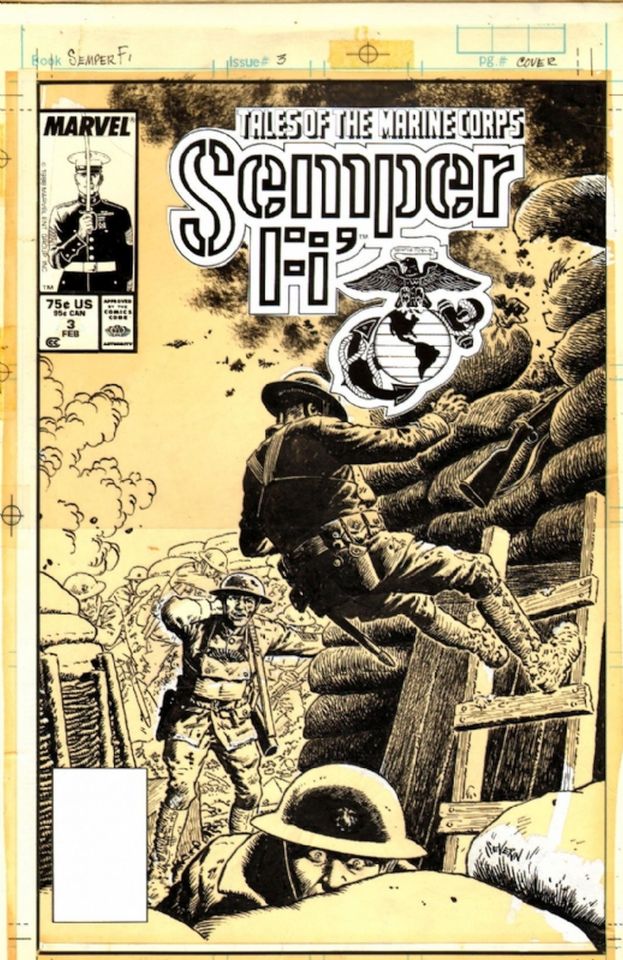

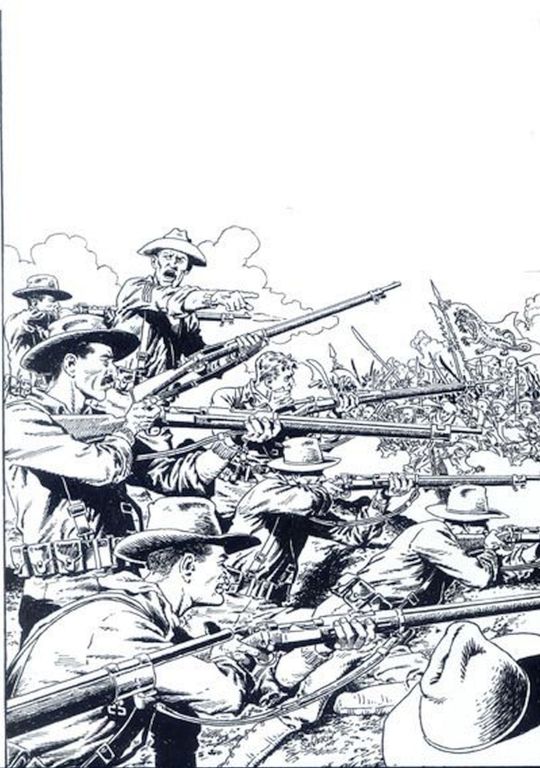
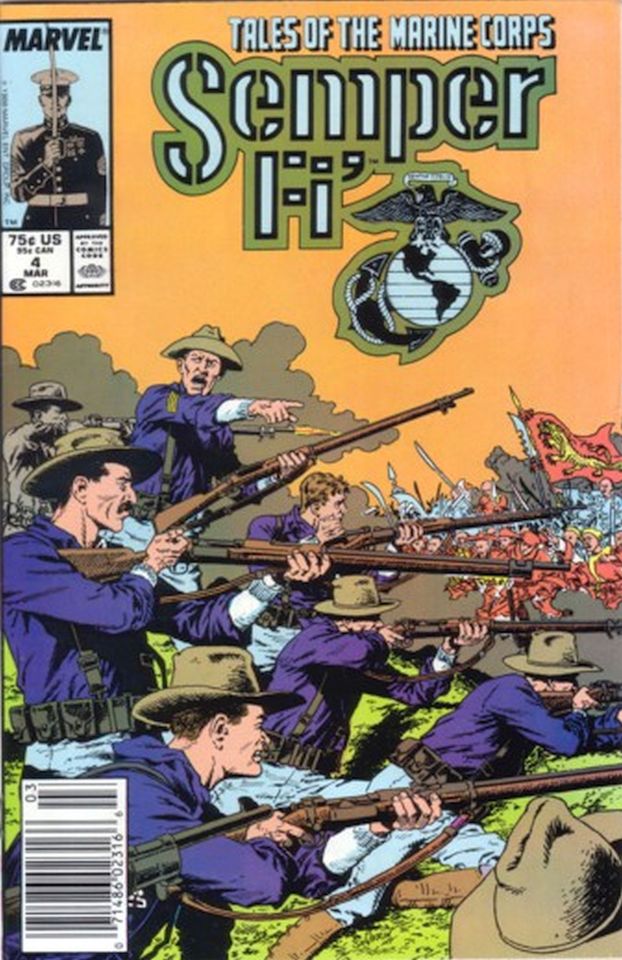



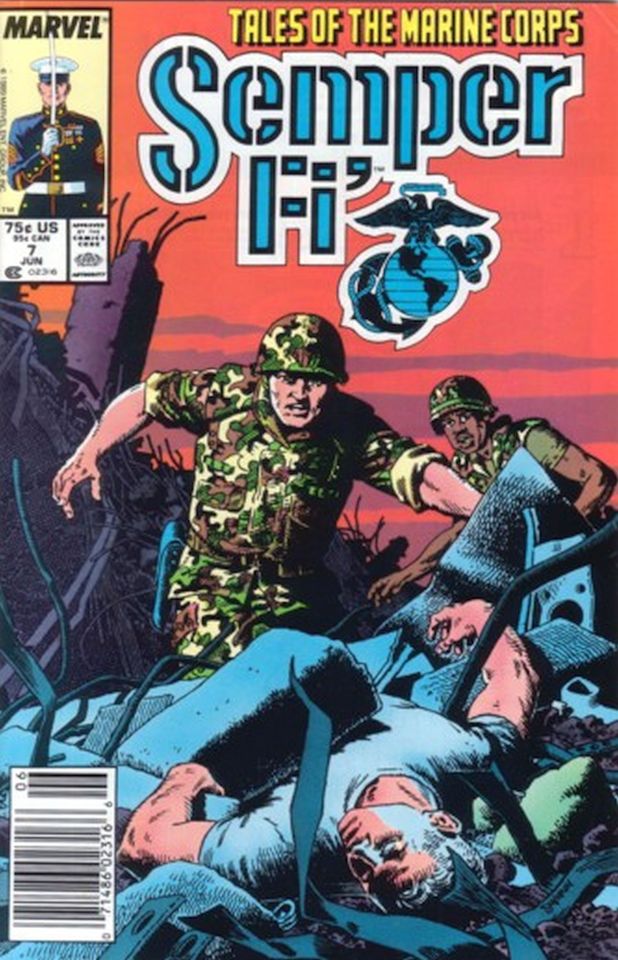
some Semper Fi' covers by John Severin
#Semper Fi#Marvel Comics#War Comics#John Severin#Master Class#Marvel#United States Marine Corps#USMC#Marines#Semper Fidelis#Comics#Art#Illustration
65 notes
·
View notes
Text









Art vs Artist 2024!
I didn't do many full pieces this year, but I tried a lot of new things, and I'm psyched to do more with paper and screentones in the future.
#this year was my first try at screentones and papercraft and comic-making#and I had SO much fun with all of the above#doing this also made me realize that I need to take more pictures of myself lmao#fiding a decent one to use here was a struggle#art vs artist#traditional art#art vs artist 2024#stellart#ID in alt text#stellar original
4 notes
·
View notes
Text

LaS Ch.7 Pg.3 Introducing, Des! Co-owned by @trak-the-pichu First Page – PMD Las – Ch.1 Pg.1 Last Page – PMD Las – Ch.7 Pg.2 Next Page – PMD Las – Ch.7 Pg.4
#sesshaxiii#pokemon#comic#page#vulpix#eevee#art#pmd#las#kit#harold#cinder#quilava#fidelis#ninetales#sableye#fae#des#jirachi
6 notes
·
View notes
Text
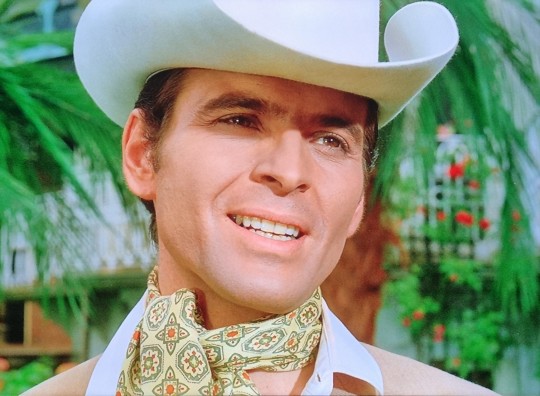
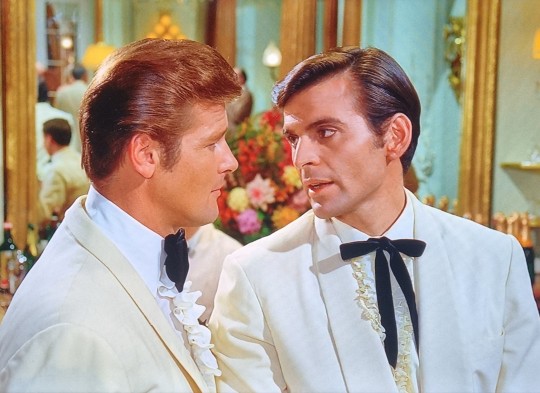
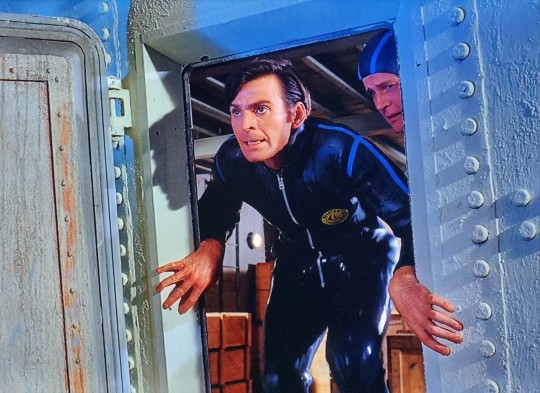
Stuart Damon guest stars as Texan oil baron (and Simon's new bff) Rod Huston in The Saint: The Ex-King of Diamonds (6.17, ITC, 1969); this episode was the direct inspiration for Roger Moore's subsequent series The Persuaders! (ITC, 1971 - 72)
#fave spotting#stuart damon#the champions#craig stirling#the saint#the ex king of diamonds#itc#1969#the persuaders!#classic tv#something about the formula of stiff upper lipped english gent with new money American wiseguy really appealed to the production team#producer Robert S. Baker and ITC head honcho Lew Grade seem to have begun planning The Persuaders! almost immediately from this point#bringing Moore back (and with a much greater creative control than he'd had even on The Saint); alas not returning was Stuart Damon#i mean i don't think it's any reflection on him or his performance here; they replaced him with goddamn Tony Curtis‚ a bona fide Hollywood#legend. but it is a shame bc Stuart is so so good here; he's absolutely having a ball with it‚ from his thick Texan accent to his over#sized cowboy hat‚ from the little subtle comic business he's doing (he sits at a table for a fancy pants high stakes card game without#waiting for their host and there's a beautiful little moment he does of realising everyone else is standing as the host enters and trying#to get back up again before everyone sits down). it's a beautiful performance‚ genuinely one of the best guest spots‚ i think‚ that the#series ever had in its 100 plus episodes. when this aired The Champions would have been roughly in the middle of its run#given the fairly lengthy production on The Saint‚ it's possible he filmed this before starting work on The Champions; then again‚ he has#top billing and is the main guest‚ which might suggest he was expected to be a familiar tv star by the time this went out#hard to say without a Pixley bible... regardless he seems to have very good chemistry with Moore. but then Curtis appeared to as well and#they apparently did not always particularly get along during filming of The Persuaders so who knows#with just 3 eps left this could quite probably be my final fave spotted in the saint; it's been quite the journey but I'm grateful to the#familiar faces who popped up along the way and made it a little easier whenever it started to feel like a bit of a slog!
13 notes
·
View notes
Video
youtube
Tracy Morgan: Bona Fide - Full Special
Lets Laugh cause Tracy is on a roll in this one
2 notes
·
View notes
Text

Here‘s the print I made for the Newmann Halloween Zine 2024! I‘ll soon also share the 2-page comic I made as well, but maybe you‘d rather go buy the zine for yourself..?
This whole project inspired me to make a whole new Newmann AU (to the surprise of no one). More details under the cut :)
Pater Hermundr Gotlieb is a monk who chose to travel to Britannia instead of settling in the german monastery he got his education from, much to the chagrin and annoyance of his superiors. He wanders from village to village, offering blessings, exorcisms and more often than not just his surprising wealth of knowledge of machinery/smithing/etc.
FRONTI NULLA FIDES (Latin phrase: "Appearances are deceptive")
There's rumors that he chose this life not out of a sense of pious and selfless charity, but rather because of his quite misanthropic nature. Maybe that's why almost no one tried to stop him when he announced his departure: no one was going to miss him.
A Dragon has been terrorizing the woods of Y Drenewydd for years now, and when Hermundr arrives to the village, the locals beg him to exorcise the beast, although they hold little hope in their heart that he'll succeed, as many knights and priests have already failed to fell it.
((It took me way too long to realize that I came up with this AU because I‘d been thinking about Emiel Regis from The Witcher, and The Secret of Kells, which both have lots of similarities with my AU (woopsie), especially the medieval fantasy setting and the monsterhunter/monster relationship.))
#FRONTI NULLA FIDES#i'll also be sharing more sketches and doodles i made#and maybe i'll get back into drawing stuff if people are interested#newmann#newton geiszler#newton x hermann#hermann gottlieb#newmann au#pacific rim au#pacific rim 2013#pacific rim#pacific rim fanart#fanart#my art#eeriedragone art#digital art
89 notes
·
View notes
Text


Everyone agrees: Dead Boy Detectives is worth talking about!
Check out these bona fides:
92% rating for critic and audience score on Rotten Tomatoes
Weeks in Netflix's top 10 most watched
Cracked the coveted Nielson top 10
Winner of the DGC Award for Outstanding Directorial Achievement
Made the top 20 most talked-about series on Tumblr for 2024
One of the highest-rated DC comic live-action shows of all time
Featured on an incredible 75+ best-of lists for 2024
#dead boy detectives#save dead boy detectives#dbda#netflix#lgbtq#lgbt pride#lgbtqia#queer#lgbtq community
143 notes
·
View notes
Note
If you've watched the Young Justice show, what do you think of Bruce and Dick's relationship there? Seems to me that it's less "unhealthy" than the main comics. Just wanted to ask because to me, you're the bona fide expert on Dick and Bruce, and also one of my favorite people on this site. Love your blog!
THANK YOU!! 🥰💞💕!!!
To be honest it's been a very long time since I've seen Young Justice but I think I know what you mean. It's very supportive right? Like in the comics Bruce is very involved in Dick's life and actions to the point that Dick runs away or gets mad or cuts Bruce off because Bruce is just too much for him. And Bruce praises dick often and also places in extreme stress because he places him on a pedestal.
In the Young Justice show, there's much fewer interactions with Dick and Bruce. But he's much better at being a dad.
youtube
Canonically, people around Dick attribute his sometimes difficult personality as a consequence of his relationship with Bruce:
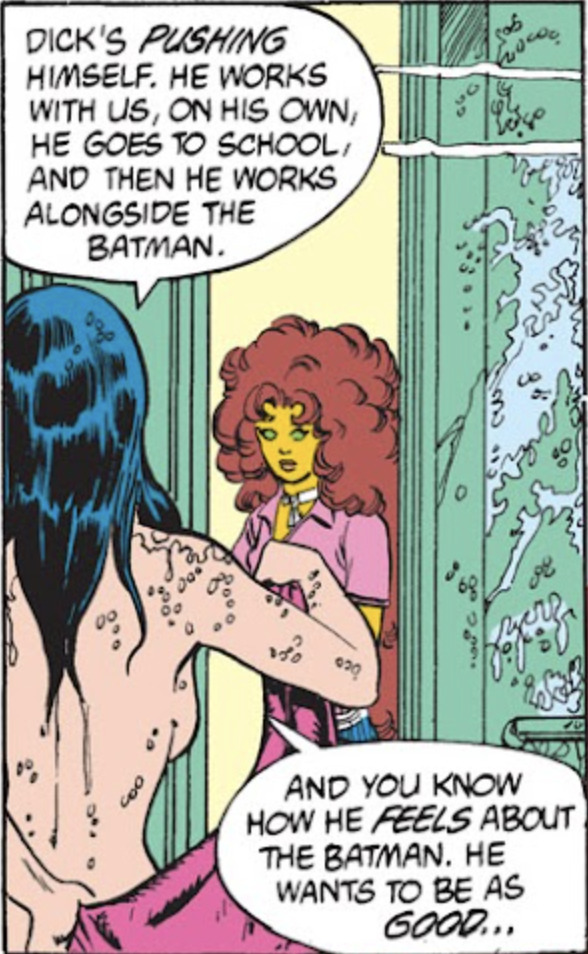
New Teen Titans (1980) Issue #28
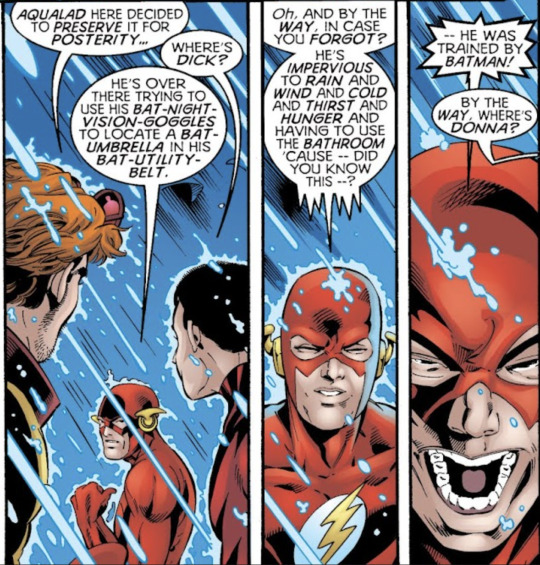
The Titans (1999) Issue #15
Like comics Bruce has given Dick severe Daddy Issues and Dick internally constantly questions himself and seeks validation because of Bruce's hot and cold attitude. Dick sees it as a failure on his behalf because if he was excellent enough Bruce wouldn't pull away right? Things would go back to the way they used to be and Bruce would rely on him again. But Bruce is suffering from the worry of putting too much burden on Dick's shoulders but also distancing himself from everyone when something bad happens. Because not only has Bruce given Dick daddy issues, he's also given Dick an extreme case of Eldest Daughter Syndrome and Dick thinks it's his sole responsibility to keep this family running. Which doesn't help because Bruce ALSO thinks it's Dick's responsibility to keep this family running.
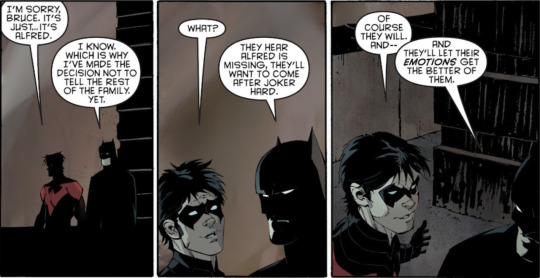
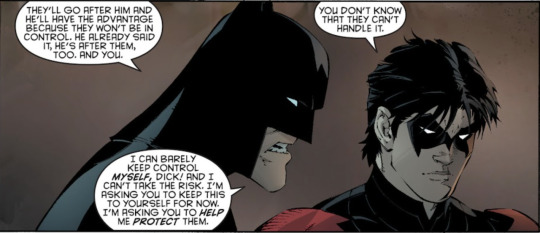
Batman (2011) Issue #14
"I can barely keep control myself, Dick! And I can't take the risk. I'm asking you to keep this to yourself for now. I'm asking you to help me protect them."
Bruce literally treats Dick like a parent to the rest of the family. But at the same time he oscillates between treating Dick like a son vs a partner and Dick as a result has developed so many complexes as a result of him filling in every single role Bruce wants him to play.
In the young justice show, Bruce doesn't place every single one of his responsibilities on Dick's shoulders. He tries to take care of them himself. He's self-aware.
youtube
So definitely healthier than in the comics. In the comics they're toxically co-dependent but in the show they're caring and independent. Both are interesting in their own ways but yes, you're very right that the show is a better way to depict their relationship because Bruce is a good dad there.
#although as a bruce wayne apologist bruce being crazy in the comics doesn't really bother me lol#dick grayson#nightwing#bruce wayne#batman#young justice#cl anon asks#cl asks#thanks for the ask!
171 notes
·
View notes
Text
Introduction to Batman: A Lonely Place of Dying, April 1990


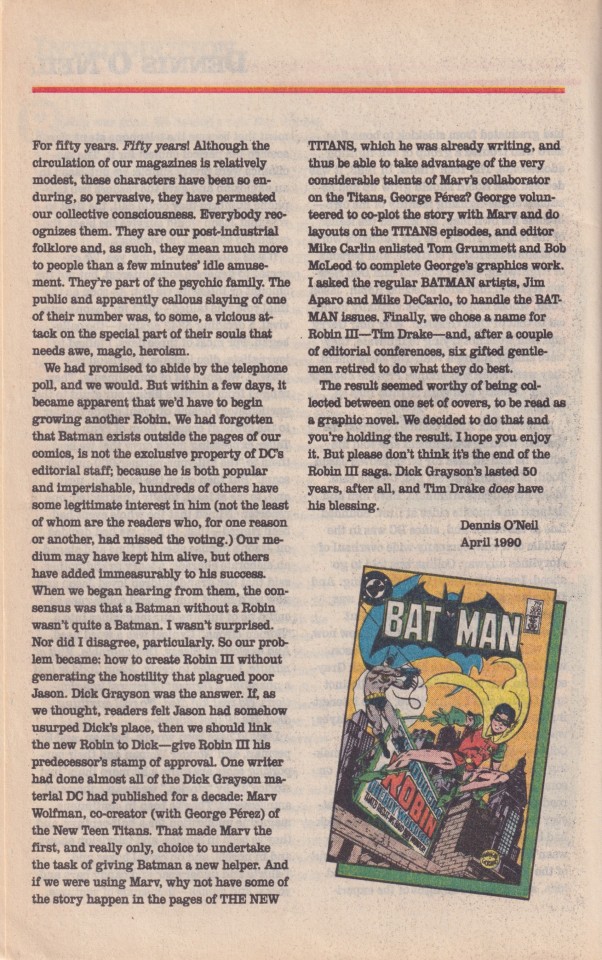
Introduction by Dennis O'Neil for Batman: A Lonely Place of Dying (1990 collected edition)
Transcription below the cut/readmore.
INTRODUCTION by DENNIS O'NEIL
Robin was gone. We needed a new Boy Wonder. There had been two previous Robins. The original first appeared less than a year after a new costumed hero called Batman made his debut in DETECTIVE COMICS #27, to instant success. Some time within the next eleven months, his creators, artist Bob Kane and his writer-collaborator Bill Finger, decided to give their dark, obsessed hero a kind of surrogate son, Robin, who was hailed on the cover of DETECTIVE #36 as “the sensational character-find of 1940—Robin, The Boy Wonder.” Over the next 40 years, Batman’s fortunes varied: always, however, Robin was at Batman’s side.
He served a couple of functions. If Batman were real (and it may shock some of our more avid readers to learn he isn’t), and if he were the grim, obsessed loner he is often portrayed as, Robin, with some help from Batman's faithful butler Alfred, would keep him sane; a man whose every waking hour is focused on the grimmest aspects of society, who is unable to release the effects of seeing his parents murdered, whose life is an amalgam of sudden violence and lonely vigilance, would soon skew into a nasty insanity if he did not have someone to care for, someone to maintain a link with common humanity. But Batman is, of course, not real. (My apologies to avid readers.) He isn’t exactly a fictional character—more on that shortly—but he does not and could not exist as a living, breathing human being. That doesn’t make Robin any less useful: he serves the same functions in the Batman stories as Watson served in the Sherlock Holmes canon and the gravedigger serves in Hamlet: like Holmes’s faithful doctor, Robin is a sounding board, a person with whom the hero can have dialogues and thus let the reader know how brilliantly he’s handling matters and like the gravedigger, he occasionally provides a bright note in an otherwise relentlessly morose narrative.
Which is why I was a trifle uneasy when we—the editorial staff of DC Comics—decided to let our audience decide whether he would live or die. It came to be known in our offices as the “telephone stunt.” We had a character, Robin, the readers didn’t seem terribly fond of. This wasn’t the original Robin, the “character-find of 1940”; that Robin was Dick Grayson and he had graduated from sidekick to bona fide hero who fronted a group of evil-fighting adolescents, The Teen Titans. In 1983, it was decreed that Robin should grow up and assume a crime-fighting identity of his own—become his own man, as befitted the leader of the mighty Titans. He left Batman’s world to assume the name, costume, and persona of Nightwing. Gerry Conway and Don Newton replaced him with a second Robin, Jason Todd, whose biography was virtually identical to that of Dick Grayson. Why not? Gerry and Don were not trying to innovate, they were simply filling a void. The assignment they were given was simple: Provide another Robin. Quickly and with as little fuss as possible.
In 1986, Max Allan Collins inherited the Batman writing assignment and told his editor he had an idea for an improved Jason Todd. Make him a street kid, Collins said. Make his parents criminals. Have him and Batman on opposite sides at first. Sounded fine to the editor and, since DC was in the middle of a vast, company-wide overhaul of storylines anyway, Collins was told to go ahead. I was the editor; I did the telling. And I’d do it again, today. Collins’s Robin was dramatic, did have story potential. But readers didn’t take to him. I don't know now, and will probably never know why. Jason was accepted as long as he was a Dick Grayson clone, but when he acquired a distinct and, Collins and I still believe, more interesting backstory, their affection cooled. Maybe we—me and the writers who followed Collins—should have worked harder at making Jason likeable. Or maybe, I guessed, on some subconscious level our most loyal readers felt Jason was a usurper. For whatever reason, Jason was not the favorite Dick had been. He wasn’t hated, exactly, but he wasn’t loved, either. Should we write him out of the continuity? It didn’t seem like a bad idea, and when we thought of the experiment that became the telephone stunt, Jason seemed the perfect subject for it. The mechanics were pretty simple: we put Jason in an explosion and gave the readers two telephone numbers they could call, the first to vote that Jason would survive the blast, the second to vote that he wouldn't.
It was successful—oh my, yes. We expected to generate some interest, but not the amount or intensity we got. As soon as the final vote was tallied—5271 for Jasons survival, a deciding 5343 against—the calls began. For most of three days, I talked to journalists, disc jockeys, television reporters. We got a lot of compliments. They ranged from a critic’s liking our stunt to the participatory drama of avant garde theater to the brilliant comedy team of Penn and Teller expressing mock envy that we beat them to “the kill-your-partner-900-number scam.” But then came the backlash, ugly and, to me at least, totally unexpected: one reporter claimed that the whole event had been rigged—that, in fact, we had decided on Jason’s demise ahead of time and staged an elaborate charade; a teary grandmother said that her grandchildren loved Jason and now we’d killed him; several colleagues accused us of turning our magazines into a “Roman circus.” Cynical was a word used. And exploitive. Sleazy. Dishonorable. Wait a minute, I wanted to reply. Jason Todd is just a phantom, a figment of several imaginations. No real kid died. No real anything died. It’s all just stories—
I would have been wrong. Batman, and Superman, and Wonder Woman and their supporting casts are quite a bit more than “just stories” if, by “stories,” we mean ephemeral amusements. They’ve been in continuous magazine publication for a half-century, and they’ve been in movies, and television shows, and in novels, and on cereal boxes and T-shirts and underwear and candy bars and yo-yos and games—thousands of ventures. For fifty years. Fifty years! Although the circulation of our magazines is relatively modest, these characters have been so enduring, so pervasive, they have permeated our collective consciousness. Everybody recognizes them. They are our post-industrial folklore and, as such, they mean much more to people than a few minutes’ idle amusement. They’re part of the psychic family. The public and apparently callous slaying of one of their number was, to some, a vicious attack on the special part of their souls that needs awe, magic, heroism.
We had promised to abide by the telephone poll, and we would. But within a few days, it became apparent that we’d have to begin growing another Robin. We had forgotten that Batman exists outside the pages of our comics, is not the exclusive property of DC’s editorial staff; because he is both popular and imperishable, hundreds of others have some legitimate interest in him (not the least of whom are the readers who, for one reason or another, had missed the voting.) Our medium may have kept him alive, but others have added immeasurably to his success. When we began hearing from them, the consensus was that a Batman without a Robin wasn't quite a Batman. I wasn’t surprised. Nor did I disagree, particularly. So our problem became: how to create Robin III without generating the hostility that plagued poor Jason. Dick Grayson was the answer. If, as we thought, readers felt Jason had somehow usurped Dick’s place, then we should link the new Robin to Dick—give Robin III his predecessor’s stamp of approval. One writer had done almost all of the Dick Grayson material DC had published for a decade: Marv Wolfman, co-creator (with George Pérez) of the New Teen Titans. That made Mary the first, and really only, choice to undertake the task of giving Batman a new helper. And if we were using Marv, why not have some of the story happen in the pages of THE NEW TITANS, which he was already writing, and thus be able to take advantage of the very considerable talents of Marv's collaborator on the Titans, George Pérez? George volunteered to co-plot the story with Mary and do layouts on the TITANS episodes, and editor Mike Carlin enlisted Tom Grummett and Bob McLeod to complete George's graphics work. I asked the regular BATMAN artists, Jim Aparo and Mike DeCarlo, to handle the BATMAN issues. Finally, we chose a name for Robin III—Tim Drake—and, after a couple of editorial conferences, six gifted gentlemen retired to do what they do best.
The result seemed worthy of being collected between one set of covers, to be read as a graphic novel. We decided to do that and you’re holding the result. I hope you enjoy it. But please don’t think it’s the end of the Robin III saga. Dick Grayson’s lasted 50 years, after all, and Tim Drake does have his blessing.
Dennis O’Neil
April 1990
#scanned so you can read & interpret for yourself (sorry for the page quality this book is 30+ years old now...still a great intro though)#tim drake#dick grayson#jason todd#batman#robin#batfam#i particularly like the part abt the heroes being psychic family/post-industrial folklore. agree. tho the jason stuff is a little agonizing#'i dunno why he was so unlikeable' meanwhile jim starlin interviews are like 'I wrote him unlikeable on purpose so they'd let me kill him'#not that jim starlin is the only reason some readers hated jason but it's like. c'mon...having writers who hate robin is certainly a factor#bonds: I knew it was you#batman: a lonely place of dying#dc comics#dennis o'neil#heroesriseandfall
139 notes
·
View notes
Text
An actual case of retconning in One-Punch Man
Wind up
The One-Punch Man manga series has seen several rewrites of chapters and parts of arcs, and several fans have taken to calling the revised chapters 'retcons'. That this isn't correct is something that has been getting on my nerves forever, but I've ignored it for two reasons. One, damn, but I do have more to do in life than carp on terminology in online fandom, and two, I've not minded the irony that One-Punch Man isn't big on retconning. However, in the most recent webcomic chapter, 152, there is a bona fide example of retconning, and so I've got to say something.
First, Let's Define Terms
First thing, what *is* retconning? It's short for 'retroactive continuity': when something that should have been established earlier in the story is written in and explained as if it was always there. If you want more on that, you can waste a few hours on TV Tropes. It's often used as a pejorative, especially with regard to mainstream Western comic book writers, where discontinuities, reboots, and retcons are common as the long-in-the-tooth properties pass from one writer to the next. However, it's rather stupid to use words wrongly as it deprives us of the ability to accurately describe and analyse what we see. It's additionally stupid because retconning is a tool, and it can be used well, even though it's easier to remember examples of poor use.
Specifics
As I've said, ONE hasn't been big on retconning. Notably, he's been happy to let the OPM manga and webcomic develop their own continuities. For example, it would have been easy for him to introduce Suiryu in the webcomic by having him recall having met Saitama and been inspired to become a hero: that would have been a retcon as we never saw the two meet earlier in the webcomic, but no. He started Suiryu as the unreformed guy he started out as and let him develop his own way.
So what's different here? Well, *nowhere* in the webcomic have Ryumon and Metal Bat had any interaction. They were introduced to each other in chapter 125, and that was it. Nowhere in the webcomic do we see Ryumon questioning his role in society, mentioning Metal Bat, or even watching Metal Bat in action from afar. However, in chapter 152, he reveals that he's been an admirer of heroes from childhood, admires Metal Bat, has been talking to Metal Bat, and has changed his MO as well as that of his group. THAT. IS. RETCONNING. 100%.
So, is it BAD? FUCK NO. IT'S A GREAT EXAMPLE. Let us dig into why it's so good. The cure for retconning is rewriting, as happens in the manga. It doesn't always pay to do so: sometimes you can't or won't go back. And you have to consider carefully whether it's worth tearing up a partially-written work to establish a new fact. In this instance, it's definitely not worth it: the FACT that Ryumon is an ally to Metal Bat is much more important than whatever PROCESS he went through to become one.
The story *needs* someone like Ryumon to act as an ally: the way the webcomic is set up, Metal Bat left on his own tod to join the Neo Heroes, so there's no one back at the Hero Association to support him. The other pro-heroes who joined with him are all either too isolated or too miserable to be of use -- yes, the selfishness of the heroes in the wc is coming back to bite them. And with his sister being held hostage, merely breaking out without an ally able to move freely within the Neo Heroes to look out for Zenko's safety would have doomed her. The story needed a 'lucky' break like this, or it'd be hopeless.
Is Ryumon the right character to use? Oh yes indeedy. First, as a stock character, we, the audience, like the idea of a gangster with a heart of gold, someone who may exist outside the law but still has a clear sense of right and wrong and who has standards about who may and may not be targeted. We're prepared to accept Ryumon in a way that we would not have been able to accept Zaedats having a change of heart (well, if he still had a heart to change... poor bastard). Second, Ryumon hasn't kicked any puppies; we haven't seen him do anything horrific. He may not have done much that is good, and it's clear that he'd been happy to regard the eventual culling of pro-heroes as no bad thing, but he doesn't come across as the sort of guy who'd applaud a completely subjugated world. It's right that he rebels.
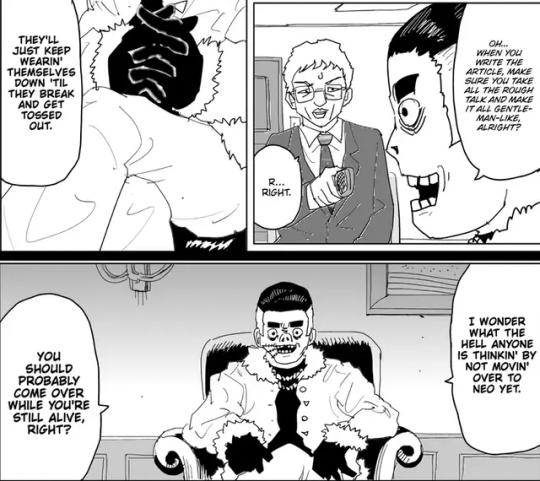
He may be no devil, but he's no angel either: the pro-heroes being a rival gang whose demise is no bad thing is his view. Note, however, that he does want to be respectable.
His rough speech and his desire for respectability make it believable that he'd get along with Metal Bat, and so we're ready to buy that he'd be influenced by the young hero to actually be heroic rather than just mime being one. Along those lines, ONE established in the wc that as the various Neo Heroes came into contact with the various pro-heroes -- Webigaza with Child Emperor, Raiden with Puri Puri Prisoner -- they have not been able to avoid being impressed and moved by their examples and testimonies.
Given all of these factors (the right character, a process we've accepted for other characters, and a strong in-story need for the character to take action), Ryumon's heel-face turn fits in beautifully, and that's how a retcon is supposed to work.
This is very unlikely to happen in the manga for three reasons. Reason 1 (the most important): ONE knows where he wants to go with the character so he can just get on and write an organic story. It is also the case that many of the pro-heroes we're following into the Neo Heroes are doing so with a plan and are working together, rather than the scattershot individualism of the wc: they have more resources. Reason 2: as a paid-for work, ONE isn't going to expect us to be happy with after-the-fact handwaving. That's why he's willing to spend months rewriting if need be. Reason 3: Ryumon in the manga has much dirtier hands than his webcomic equivalent, having organised hero betting and planning worse. We are going to have to see him change. And with him already butting heads with Metal Bat, there is plenty of scope for just that to happen. Not too easily, I hope! :D
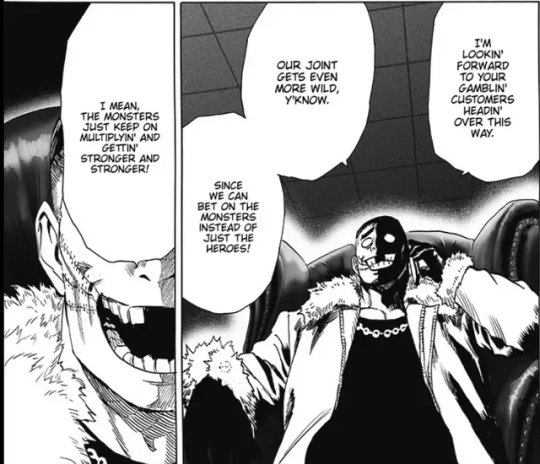
Not only is he no angel, but he's still actively criminal.

We don't need the webcomic to know that this is going to be interesting, but now we can look forward to this being INTERESTING.
Call to action
Please, for fuck's sake, can we use the right words? The no longer canon chapters are SCRAPPED or REDACTED. Their replacements are REVISIONS. Otherwise, we're just babbling nonsense.
#One Punch Man#OPM manga#OPM webcomic#writing tools#retroactive continuity#Ryumon#Metal Bat#yes retconning is often done badly but that's no reason to use it as an insult#when it's used well -- as it is here -- it feels natural#please use the right terms
28 notes
·
View notes
Text
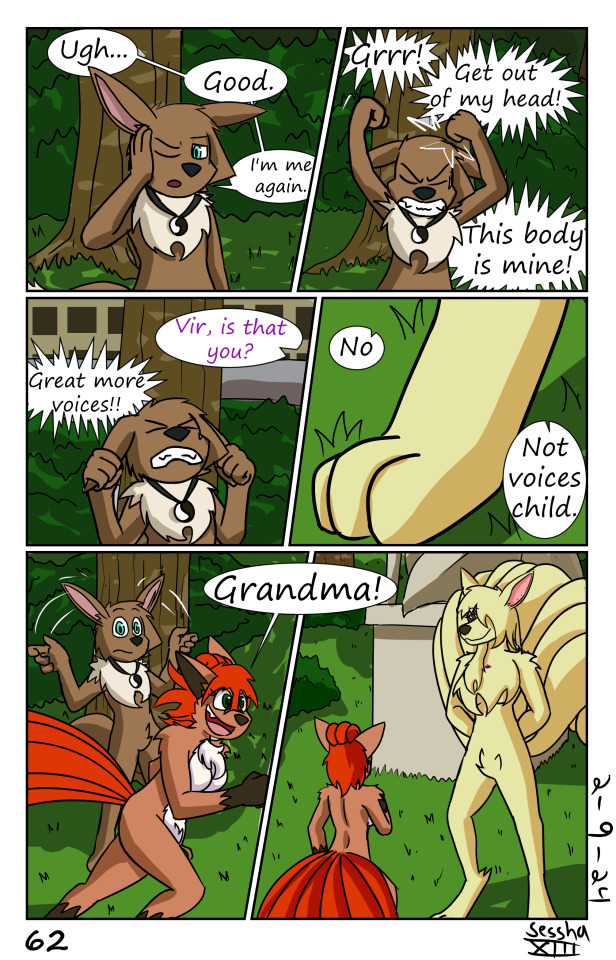
LaS Ch.7 Pg.2
Reenter, Lady Fidelis
First Page – PMD Las – Ch.1 Pg.1 Last Page – PMD Las – Ch.7 Pg.1 Next Page – PMD Las – Ch.7 Pg.3
11 notes
·
View notes
Text
reasons why you should watch Ducktales (2017):
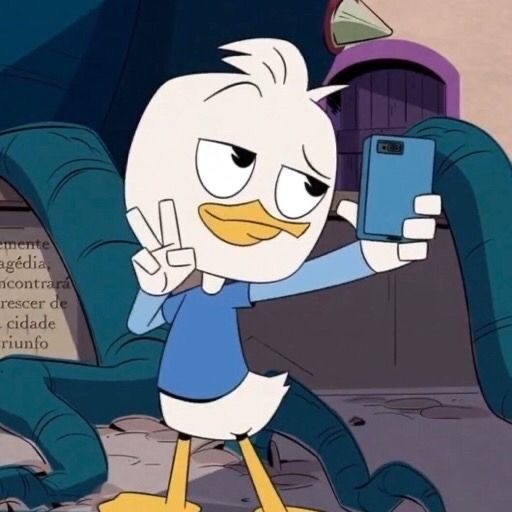
from a totally not mentally ill (/j) girl who has never ever obsessed over this show and has never ever seen it ten times over and has never ever had a bias towards this show :))) ily
the animation is lowkey a slay. I live for the faux comic book style. it scratches an itch in my brain.
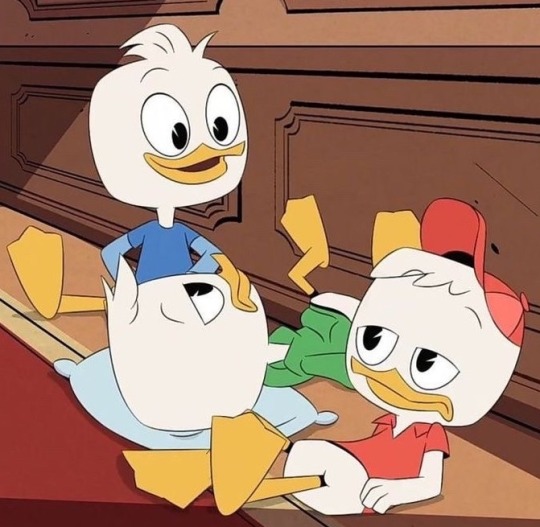
I love Louie. I love Louie so much. he is precious, a cinnamon roll, and if anything were to happen to him, I would unalive everyone in this room and then myself.
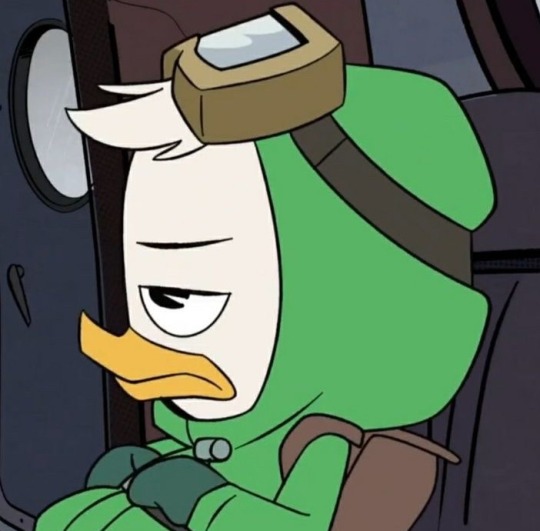
the “found family” trope has been and always will be the best trope (imo). and this show has sooooo much of it and I literally cry over it (yes, I do cry over everything. back off)
launchpad mcquack.
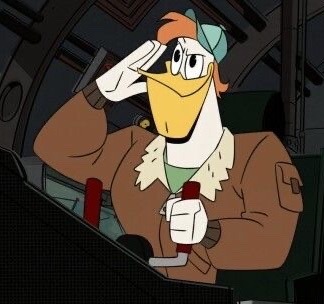
precious precious man.
the storyline is kind of……… wonderful???? like there’s a lot of mirroring of the past, wholesome moments, and just… fun??? (Disney please bring it back or do a spin off I beg you 🙏)
this is one of those Disney shows that’s weirdly… funny? watch s3:e2 “Quack Pack” if you don’t believe bc that episode is a bona fide RIOT
also, the “filler” episodes don’t necessarily feel like filler episodes. most have some relevance to the ongoing plot, and if they don’t the adventure is too fun for you to care anyways
for instance? my fav episode “Quack Pack” (as listed above) is a filler episode. but it is semi-plot-relevant, and comedic perfection. it also gave us this screenshot:
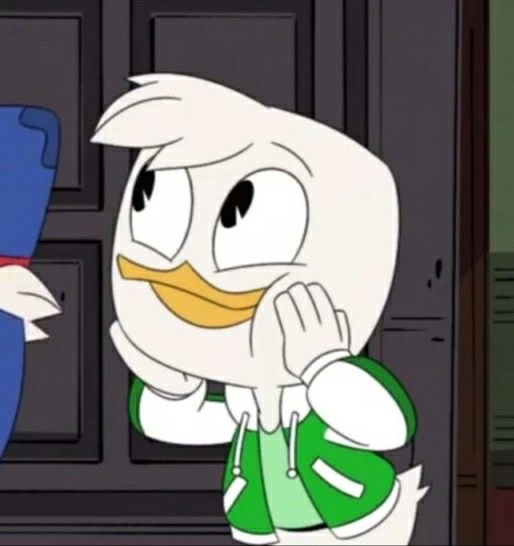
need I say more?
yes. I won’t shut up about this show.
honestly, in a world full of tv shows that don’t give a crap about their integrity, Ducktales is a masterpiece. and I’m not just saying this because I wish more people would join the fandom. that’s a perk
once again I leave you with this:
me n the boys jamming out to the Ducktales theme song:

#I convince my cousin to watch this#I’ll convince you too#Hope rambles sometimes oops#ducktales#duck tales#louie duck#launchpad mcquack#disney channel#disney channel show
68 notes
·
View notes
Note
ajjaha idk if im Seeing stuff again but in the latest chapter of your happy ending qsmp comic, wqas cellbit 'fiding' doied scene inspired or a nod to the Iconic shinning scene ? if not it still cool to see the idea come back even if not voluntary kkk (great comic i love the dragons eggs design so much aaaaaa)
Yup! That one was intentional uwu We need to respect the classics
24 notes
·
View notes
Text

Shamelessly posting my X-Men sona Pip Felidae aka Lynx
Made him years ago, just your average orphaned mutant that Erik finds and drops off at the school for Charles who in turns dumps them onto Logan cause as much as he refuses to get attached that man collects kids like nobody’s business. Wolverine is a bona fide girl dad with Rogue, Jubilee, and Laura. What’s one more adhd child right?
Pip is FtM in the works of making a coming out comic, just been rewriting it😭
They have a very noticeable feline mutation, while modeled after your average house cat I thought the name Lynx was just funny for a hero name.
Anyways imma stop blabbing about him now sory

#fanart#tomcat draws#Wolverine#logan howlett#james howlett#implied trans Wolverine#x men 97#x men comics#x men#magneto#Deadpool#wade wilson#oc#oc artwork#x men oc#mutant oc#pip felidae#lynx#PIP IS MY OC INCASE THATS NOT CLEAR#like and/or reblog!#okay now bye
51 notes
·
View notes
Note
https://www.tumblr.com/skaruresonic/758528409170313216/yes-woolie-you-can-win-any-argument-if-you-just
I want to point this it. The person defending the comic unknowingly completely eradicated any ground their argument could have stood on.
"Criminals don't deserve to be free if they're gonna hurt people"
Then why does IDW Sonic keep letting his villains run off scott free when he himself acknowledges that they're gonna continue being evil and hurting innocents?
The single real and true answer is that this comic has abysmal writing. But stans don't want to accept that. They'd rather make up increasingly baffling conspiracy theories.
Exactly. It gets even worse when you realize Sonic presents himself as an arbiter of freedom: he wants people to do what they want, as long as it's the "right choice."
He is the one who decides what is right. He may not explicitly come right out and say so, but that is what he says through his words and his actions. And rather than accept the notion that some people will choose something other than what he wants, he'll punish you by chewing you out or beating you up, despite any mitigating circumstances, such as Surge's abuse at Starline's hands or Metal Sonic and Eggman TELLING HIM THE KILLER ROBOT HAS NO FREE WILL.
The only thing more dangerous than an authoritarian is an authoritarian who's a fucking idiot.
That may or may not be the comic's intention, but that's what ends up being the takeaway when we're given these lengthy lectures about the supposed sanctity of freedom, only for Sonic to betray his own principles.
He doesn't give a shit about anyone's pain. That much is clear.
He leverages Shadow's trauma against him to win an argument.
He ignores how Espio is grieving the loss of his friends to obnoxiously argue "oh so we should murder everyone, huh, Espio? is that what you're saying? we should never give anyone a chance?"
He makes fun of Belle at several points and even looks annoyed when she's angsting about her situation in one instance.
He claims he'd be willing to give "even [Eggman and Starline]" a second chance, only to eulogize Starline with "big oof."
He ignores Surge's pain just to say he'll kick her ass, then eulogizes her with a line so cold you'd think it came out of Eggman's mouth.
He shuts down Tails' misgivings about Metal's release not once but twice.
He drops the "Surge is dead" bomb on Kit without any real tact or follow-through to make sure the traumatized child is okay.
He tells Kit that Surge is "hurting herself."
Yet he throws a fucking pity party for himself in issue 23 about how Eggman "makes him pay" for daring to believe in the "good in people" every day.
Cry me a river. Kick rocks. Get bent.
IDW!Sonic lacks the emotional intelligence to distinguish when someone in pain is lashing out vs. a bona fide unrepentant asshole killing people for fun.
To him, both are the same errant children in need of a paddling. Just as he'd lack the pragmatism to seal the Erazor Djinn in the lamp because muh freedom, he'd lack the empathy to comfort Shahra afterward.
24 notes
·
View notes
Text
Pinned post ho~! ✨

Banner art
🎨 My Art tags
General Art tag
Comic
Animation / Animatic
Doodles
My OC (Fi Fidelis)
🎥 By Series
MM Works
House of Mouse
MM Clubhouse
MM 2013
MM Funhouse
Disney Comics
🎮 Games
Kingdom Hearts
Disney Sports
📝 Post type
Text (random thoughts)
Video
Audio
Asks
23 notes
·
View notes